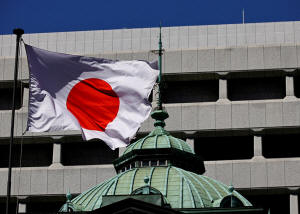Bank of Japan made hawkish tilt, debated inflation risk in June, minutes
show
 Send a link to a friend
Send a link to a friend
 [August 05, 2024] By
Leika Kihara [August 05, 2024] By
Leika Kihara
TOKYO (Reuters) -At least two of the Bank of Japan's nine board members
called for an early interest rate increase at a policy meeting in June,
minutes showed on Monday, underlining the central bank's hawkish tilt
that provides scope for further hikes ahead.
"Members agreed that the yen's recent falls were among factors that push
up inflation, and must warrant close attention in guiding monetary
policy," the minutes showed.
The discussions underscore how yen moves and concerns over an inflation
overshoot were key factors discussed at the BOJ's June meeting, and led
to its decision in July to raise interest rates to levels unseen in 15
years.
With the Japanese currency having sharply reversed course to hit a
7-month high on Monday, markets are focusing on BOJ Deputy Governor
Shinichi Uchida's speech on Wednesday for clues on the pace of future
rate hikes.
"Given how latest yen rises are reducing the risk of an inflation
overshoot, we expect the BOJ to hike rates at a cycle of once every six
months," rather than at a more frequent pace, said Yoshimasa Maruyama,
chief market economist at SMBC Nikko Securities.

The yen's latest surge has been buoyed by weak U.S. labour data, which
has stoked recession worries. The Japanese currency strengthened as much
as 3.4% to 141.675 per dollar on Monday, before easing to 143.165.
ROUT CLOUDS RATE OUTLOOK
While the BOJ kept interest rates steady at the June meeting, some board
members warned that rising import costs from a weak yen were hurting
consumer sentiment and heightening the risk of an inflation overshoot,
the minutes showed.
One member said the BOJ must consider "adjusting the degree of monetary
easing" to forestall future risks of an inflation overshoot, given how
firms are renewing efforts to pass on increasing costs to consumers.
"Another member said the BOJ must continue to closely monitor relevant
data in preparation for the next meeting in July and, if deemed
appropriate, raise interest rates without delay," according to the
minutes.
The yen, which hovered around 157 to the dollar at the time of the June
meeting, hit a 38-year low below 161 in July - a move that likely
affected the BOJ's decision to hike short-term rates to 0.25% from
0-0.1% at the July 30-31 meeting.
[to top of second column] |

The Japanese national flag waves at the Bank of Japan building in
Tokyo, Japan March 18, 2024. REUTERS/Kim Kyung-Hoon/File Photo

Following the rate hike in July, BOJ Governor Kazuo Ueda did not
rule out another increase this year and stressed its readiness to
keep hiking borrowing costs to levels deemed neutral to the economy
- seen by analysts as anywhere between 1% and 1.5%.
But the latest market rout, which came days after the BOJ's rate
hike decision, raises questions on whether the central bank can
proceed with further raising rates.
Finance Minister Shunichi Suzuki said on Monday authorities were
watching market moves closely, after the Nikkei stock average
plummeted in its biggest rout since 1987.
Opposition party leader Kenta Izumi said in a post on X on Monday
that BOJ Governor Kazuo Ueda must be summoned to parliament to
explain the rate decision, though it was unclear whether the
government would heed to the request.
Japanese manufacturers, which reaped windfall profits due to the
weak yen, have set their business plans based an average assumed
dollar/yen rate of 144.77 for the current fiscal year, according to
the BOJ's June "tankan" survey.
A sustained yen rise above that level may hit manufacturers'
earnings and the export-reliant economy, analysts say.
"From an economist point of view, U.S. and Japan economies aren't
that bad now and the fall seems to be a quick correction of stock
and currency markets that had been swollen by overseas investors,"
said Saisuke Suzuki, senior economist at Mizuho Research &
Technologies.
"But this could cause a so-called 'negative wealth effect' on
Japan's household spending that could delay the consumption led,
wage growth-driven recovery scenario by crushing retail investors'
confidence," he said.
(Reporting by Leika Kihara; Additional reporting by Makiko Yamazaki,
Satoshi Sugiyama and Yoshifumi Takemoto; Editing by Tom Hogue, Shri
Navaratnam and David Evans)
[© 2024 Thomson Reuters. All rights
reserved.]
This material may not be published,
broadcast, rewritten or redistributed.
Thompson Reuters is solely responsible for this content.
 |